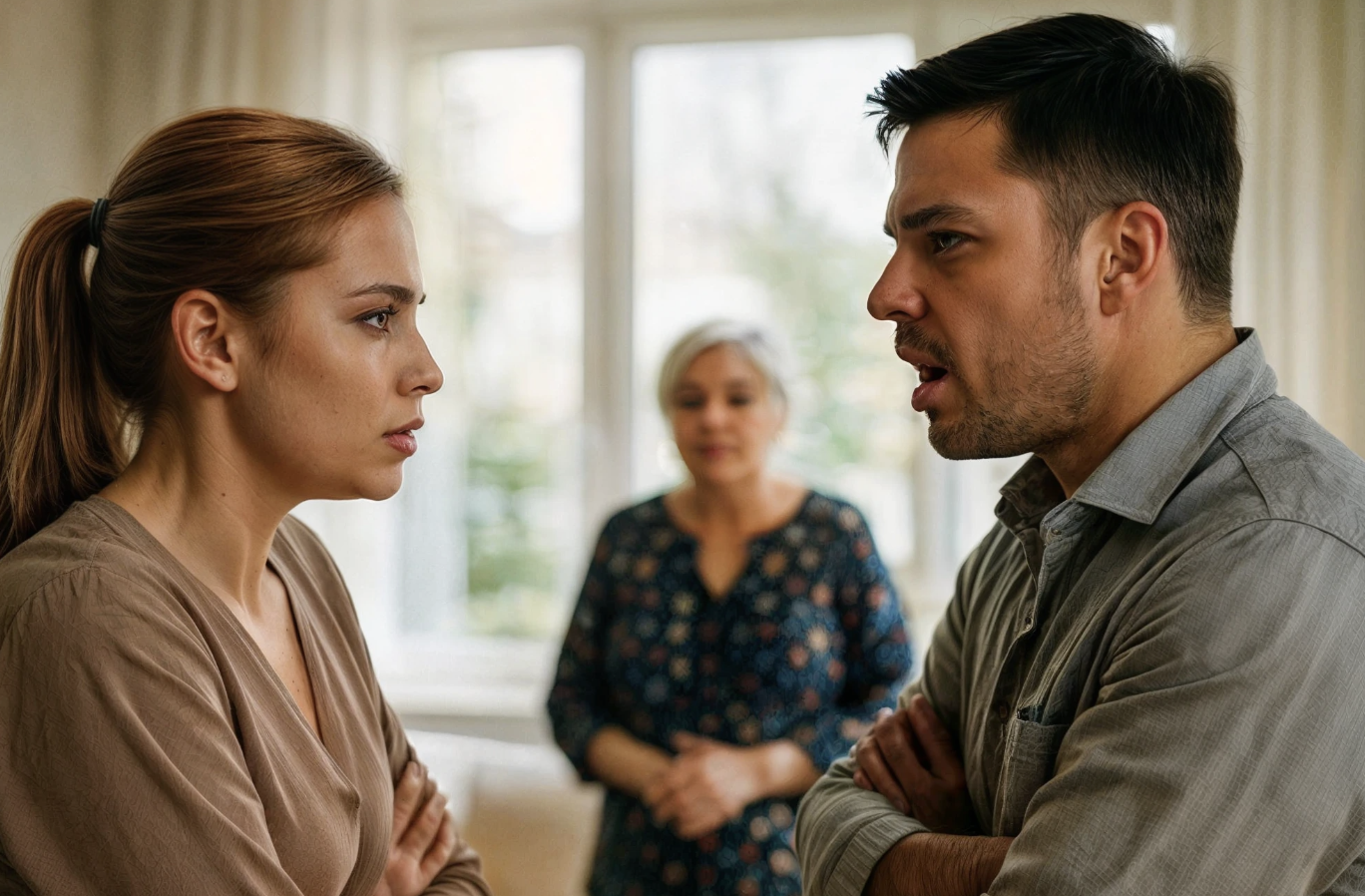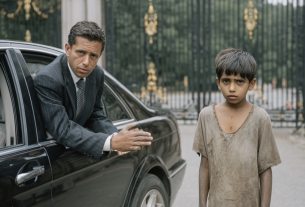“Mom says they’ll be here for lunch. Don’t forget we’ve got cutlets in the freezer, you froze them yourself,” Sergey said lazily, pulling a shirt out of the wardrobe.
Ksenia stood at the sink, a sponge in one hand and a piece of soggy baguette in the other. The bread, like her, clearly had no intention of surviving until evening in a normal state.
“Yeah. I remember. What are we now, on a restaurant schedule? Guest service from twelve to eight, no days off,” she said quietly but pointedly, without turning around.
Sergey shrugged and, with the air of someone who had done his duty, went into the bathroom. The mirror door thudded shut, like the door of a prison cell.
Ksenia looked around the kitchen again. The sink was full of dishes, the table covered with crumbs, the floor marked with someone’s slipper prints. On the windowsill, a bunch of parsley was hopelessly withering. Her husband’s family had once again left behind a hurricane: one telling jokes and spitting sunflower seed shells, another being rude about the soup being “under-salted.” But, as always, it was Ksenia who had to make the tea, Ksenia who had to go look for the sugar, Ksenia who had to clean up after the family.
For six years now, her apartment had stopped being “hers.” It had become a “meeting point,” like a factory cafeteria where people drop by, eat, and laugh loudly—but no one washes their own spoons.
“Family’s the main thing,” Sergey liked to say. “Family is sacred. Or you’re not part of the family?”
“No,” she had honestly answered once. “I’m more like the service staff. With a dishwashing specialization.”
He’d snorted then, thinking she was joking.
She hadn’t been joking.
“Well, daughter, ready for lunch?” Elena Petrovna came into the apartment briskly, tilting her head slightly, like a cat sniffing the air to check if there’s fish in the house.
“Hello, Elena Petrovna,” Ksenia replied in a restrained tone. “You’re cooking lunch today. The cutlets are in the freezer, the potatoes are in the drawer. The frying pans are over there.”
Her mother-in-law froze, as if someone had slapped her across the face with a wet towel.
“Me? Cook? I’m sixty-seven, I have high blood pressure. Since when is it a thing for the lady of the house to refuse to feed her guests?”
“I’m not refusing. I’m just redistributing responsibilities. This isn’t a restaurant with delivery on call, you know. And I’m not a cook on demand,” Ksenia answered with a light, almost invisible smirk.
“How dare you?” Elena Petrovna’s voice began to ring, like wire in the frost. “This is my son’s apartment, and I have the right…”
“Not exactly. The apartment is mine. Bought before the marriage, registered to me. Sergey only brought his slippers here, and even those were someone else’s—your present.”
“Don’t you talk to Sergey, you talk to his mother,” Elena Petrovna pressed her lips together, though she did glance at the frying pan. You could almost see her thinking: “Maybe I really should just fry them…”
“I’m talking to a woman who doesn’t respect someone else’s home,” Ksenia stepped closer. “Who thinks it’s normal to show up without warning, rummage in my cupboards, and make comments about my bras hanging in the bathroom.”
“I just wanted to help. You’re ungrateful.”
“Helping is when you ask, ‘May I?’ Not when you announce your arrival like a landing party.”
By evening Sergey came home. Annoyed, with two bags from Pyaterochka, which contained cucumbers, beer, and a packet of wafers.
“What did you do? Mom’s in tears. She says you kicked her out!”
“I didn’t kick her out. I suggested equal terms. Don’t want to clean—don’t make a mess. Don’t want to cook—don’t come hungry. Sounds fair to me,” Ksenia wiped her hands on a towel and calmly sat down at the table.
“You know what she’s like… a bit… peculiar. But you could be more patient. It’s my MOM.”
“Sergey, I’ve been patient for six years. Now I want to live. Just live. Without walking in on your Aunt Lyuba in a robe in front of my mirror. Without your uncle, who calls me ‘my lady’ and forgets to flush the toilet. I’m tired. This is MY home. Mine.”
Sergey poured himself some beer without looking at her. Took a gulp. Then another. And then… exhaled:
“Listen. You’re going overboard. Maybe you should see a doctor?”
She fell silent. Slowly walked to the window. Looked out at the evening Moscow sky, at the windows of the building across the way. Someone was laughing there, someone banging a cupboard door.
“Sergey,” her voice dropped low, almost masculine from exhaustion, “did you seriously just say I should see a doctor?”
He said nothing. Pretended he hadn’t heard.
She turned around.
“Listen, if you can’t see that there’s nothing left of me in this apartment, then you’re the guest here. And it’s in your best interest to leave gracefully.”
“Is that a threat?” He raised his eyebrows.
“It’s an offer. Before it’s too late.”
He got up. Picked up his mug. Finished his beer. And slowly walked into the hallway.
“I’ll come back. When you’ve cooled off.”
“Better not,” she said to his back. “It’s finally starting to feel more spacious in here.”
When the door shut, Ksenia sat down on the couch.
Silence. No shouting, no footsteps, no clinking dishes. Even the fridge fell quiet—apparently frightened too.
She sighed. And for the first time in many years thought:
“I’m… not to blame.”
She didn’t have to apologize for her boundaries anymore. Didn’t have to explain why she wanted to be alone. Didn’t have to feed people who came with a shopping bag and left with complaints.
In the kitchen stood that very same frying pan. The one that never ended up being used. And staring at it, Ksenia suddenly burst out laughing. Loudly, hoarsely, from the gut.
“Well, girlfriend, how about we fry ourselves an omelet?”
And pulling out the eggs, she cooked dinner—for the first time in a long time—just for herself.
A week passed. Quiet, like after a storm. No calls, no visits, no “Ksyusha, you don’t mind if we…?” Nothing. Just one message from Sergey, short and brutally clear:
“I’ve filed for division of property. We need to talk.”
At first Ksenia was furious. Then she got scared. And then… she made herself a coffee with liqueur. Because, as she had realized, in this apartment, she could now do that.
“Classic,” she muttered, scrolling through articles about division of marital property on her phone. “You get divorced and suddenly remember I’ve got a good TV. And the bed, by the way, is orthopedic. He moved in here practically in his underwear and with mommy, and now he wants half. Well, why not, sounds fair.”
She finished her coffee and did the thing she’d been most afraid of. She called a lawyer friend—the same Tatyana who had divorced three times and each time walked away with everything, including the car, the dacha, and one of the cats.
Tatyana picked up instantly, as if she’d been waiting.
“Oh, Ksyu, you’ve got the ‘I’ve finally figured it out, but it’s already too late’ voice,” she said briskly. “What, you finally kicked that barin in slippers out?”
“Something like that,” Ksenia sighed. “Only now he’s decided I owe him half the apartment.”
“And whose name is the apartment in?”
“Mine. Bought before marriage, I paid off the mortgage with my grandma back then.”
“Uh-huh. Then he can only try to claim the jointly acquired stuff. What, you hang some fancy chandelier?”
“I did. And curtains. Simple ones. Just expensive. So they’d really catch the eye.”
“Then brace yourself. And remember this: smile when he lies. Smile when his mom sobs. Smile when his lawyer says he ‘put his soul into this home.’ We’ll handle everything else.”
On Sunday, right on cue, the doorbell rang. Ksenia opened it and nearly laughed. A whole delegation was on the threshold:
Sergey, in a wrinkled jacket, holding a folder.
Elena Petrovna, in a suit adorned with a brooch the size of a guilty conscience.
And some small man who looked like an underdeveloped notary with a grudge. Against life, in general.
“Good afternoon, Ksenia Vladimirovna,” this character squeezed out, looking at her as if she were a thug in slippers. “I represent the interests of Sergey Viktorovich. We’ve come to peacefully discuss a possible settlement of the property division issue.”
“Come in,” Ksenia nodded, gesturing with her hand. “Shoes off, please. It’s still clean in here. For now.”
They sat around the table. Sergey poured himself some water. His mother stood by the window, theatrically, like an actress in the third act: I stand here and watch the family collapse because of a heartless daughter-in-law.
“Ksyusha,” Sergey began in the voice of an offended schoolboy, “I don’t want any conflict. But just humanly: I lived here. I contributed something. We bought appliances together. You’re not going to deny that, are you?”
“Yeah,” she nodded. “Your mom gave you the washing machine as a New Year’s present. I bought the vacuum cleaner with my own money. And the toaster. And the fridge is still from my first husband. So… It’s all very sad, Sergey, but, how to put it… in this home you’re like a guest who’s lost his key and is demanding a new one.”
The lawyer cleared his throat:
“Our client believes he has a right to part of the movable property. Including the sofa, the kitchen set, and the TV. Especially the TV. It was bought during the marriage, therefore…”
“Therefore,” Ksenia interrupted him, “it’s not a TV, it’s the coffin of our family life. Inside it died my weekends, my movies, and my attempts to have heart-to-heart talks. So take it. With delivery. I’ll carry it out myself. Would you like that?”
“Ksenia,” Elena Petrovna broke in melodramatically, “you were like a daughter to us. We accepted you. And now you’re throwing us out onto the street. And you kicked my son out like a dog. What kind of person are you?”
“Me? I’m the kind of person who spent seven years frying pancakes to the soundtrack of your moaning about ‘if only we had a toaster.’ And then cleaned up your napkins, your champagne, and your advice on how I should dress.”
“I told you that at thirty-eight it’s already too late to wear ripped jeans,” Elena Petrovna flared up.
“And I told you that at sixty-seven it’s too late to control other people’s lives. But you didn’t listen.”
“Enough,” Sergey stood up. “Let’s just come to an agreement. Otherwise I’m going to court. And I won’t be alone.”
“How many of you will there be? You, your mom, and the toaster?” Ksenia smirked. “Fine. Court it is. I’ve been wanting someone official to hear how your mother threatened to ‘strike me from life,’ and how you walked out with my slippers under your arm because ‘you don’t wear them anyway, I’m used to them.’”
The lawyer flushed. Sergey sat back down. Elena Petrovna dramatically dabbed at her eyes with a monogrammed handkerchief.
After the “delegation” left, Ksenia couldn’t fall asleep. Her heart pounded like an old alarm clock—loud and pointless. She brewed herself chamomile tea, drank valerian drops, and tried to convince herself everything was under control.
But inside there was a different feeling. Not fear, not even anger. But… loneliness. Sharp, quiet, like the silence after a door slams.
And then, in the middle of the night, a message came through. From Sergey’s adult son from his first marriage. His name was Anton, he was twenty-seven, lived in another city, and had hardly ever talked to Ksenia.
“Ksenia… I know what’s going on. I’m sorry. You were the only normal one in this family. If you need me to testify, I will. And really—thank you. For at least trying to endure this swamp.”
She read the message three times. Then she cried. Not because it was touching. But because she’d never expected that anyone had noticed her efforts at all.
In the morning she called Tatyana.
“Tanya. Let’s go all in. So that after this they look at Ikea like it’s a palace.”
“Got it. There’ll be surprises. The main thing is—don’t doubt.”
Ksenia looked around her apartment. At the kitchen where it didn’t smell like instant soup. At the bookshelf. At the armchair where no one had left a jacket behind.
She smiled.
“I don’t doubt anymore, Tanya. Not ever.”
The hearing was set for Tuesday. Paradoxically, it was always on Tuesdays that Ksenia’s crises seemed to happen: spilled borscht, the cat’s hemorrhoids acting up, or a sudden raid of guests dropping by “just for a cup of tea.” So the idea of defending her property on a day of chaos even seemed logical.
“Just keep a straight face,” Tatyana insisted, handing her a pen and a folder before the session. “If you want to hit—hit. If you want to cry—cry. Just no begging. You’re the side that had both the laundry detergent and common sense.”
Ksenia nodded. Lips tightly pressed together. Her heart pounding. In the courtroom there were about twenty people, including Elena Petrovna, dressed as if for a ball at the Livadia Palace, and Sergey, clearly changed right in the car: wearing a shirt from someone else’s wardrobe and the face of a man who’s forgotten why he’s here.
The judge was a woman of about fifty, with a hairstyle that silently screamed: It’s not my fault, it’s the humidity. She looked at Ksenia just a little longer than at the others.
“So, you maintain that the real estate is not subject to division?”
“I do. It was bought before the marriage. I have the contract. The certificates. There’s even my grandma’s note on the back that says: ‘This is Ksyusha’s nest.’”
The judge smirked. Sergey’s lawyer shifted in his seat.
“And the joint property?”
“The TV, the vacuum cleaner, and a broken hair dryer. Everything else was either a gift or bought by me.”
Elena Petrovna couldn’t hold back:
“And why isn’t she mentioning the gold earrings I gave her for her jubilee? She thinks I’d forget?!”
“Because they were clip-ons, Elena Petrovna. And they cut my earlobe. I spent two weeks soaking my ear in vodka in a shot glass afterward.”
The judge exhaled heavily.
“Let’s move on to the witnesses.”
Ksenia tensed. And then in walked… Anton. The same adult son of Sergey’s. In a suit, standing straight, eyes full of resolve.
“Identify yourself,” the judge said.
“Anton Sergeevich. The defendant’s son from his first marriage. I lived with my father and Ksenia for a time. I can say a lot.”
“Go ahead,” the judge nodded.
“I’ll be brief. Ksenia has always held this household together. My father is a good man, but passive. He never took care of the home; everything fell on her. She carried him, my grandmother, and all our visits on her back. And now he’s come here to demand half. Half of what? What he never built?”
Sergey jumped up:
“And who are you, anyway, to—”
“I’m your son,” Anton replied calmly, steadily. “And I’m ashamed to have a father like you.”
Silence descended on the room. Even Elena Petrovna was struck dumb.
The court’s decision came quickly: the property was not subject to division; everything remained with Ksenia. Sergey had the right to take his personal belongings, including his suit, drill, and collection of Avtomir magazines. His claim to the toaster was denied—it was recognized as a gift from his wife.
Ksenia walked down the courthouse corridor as if it were a runway. Her mind was empty. Just a ringing stillness. She stepped outside, drew in a breath, and the air suddenly seemed… tasty. Without the aftersmell of someone else’s soups, cheap cologne, and cigarette smoke.
“Ksenia!” Tatyana caught up with her. “Well, congratulations! Let’s go celebrate?”
“No,” Ksenia shook her head. “I’m going home. Today… I just want to be alone. With myself. No guests. No inspections. No ‘why are you dressed like that.’”
“You sure?”
“More than sure.”
She came home. Took off her shoes. Looked at the walls. The home was… hers. No footnotes, no “registered relatives,” no claims.
She sat down on the couch. And for the first time in many years—did nothing.
An hour later the intercom buzzed. She flinched. Went to pick it up.
“Yes?”
“It’s me. Sergey. I came for my things.”
“Five minutes. I’ll bring them down.”
She packed his stuff: shirts, those “favorite slippers,” the suit three sizes too small. She added an issue of Avtomir with a bookmark on the page titled “Faulty Brakes—Cause of Traffic Accidents.”
She opened the door. He was standing there with his eyes lowered. No longer the same man—not confident, not arrogant. Just… lost.
“I… didn’t think it would turn out like this,” he muttered.
“And I didn’t think I’d manage to get out of it.”
“We could have gone back to how it was…”
“We could have. But you chose to divide me into percentages. Half a wife, a third of an apartment, a quarter of respect.”
“I’m sorry.”
“Don’t. ‘Sorry’ is for accidents. You did everything consciously.”
He took the bags. Turned around. And left. No drama. No door-slamming. He just… disappeared.
That evening Ksenia sat with a glass of dry wine. The radio was playing quietly in the kitchen, the cat lazily batted a jar lid across the floor. On the table there was a single sandwich. Just one. Because now she didn’t have to cook “for everyone.”
Her phone lit up. A message from Anton.
“If you’re ever in Petersburg—I’d really like to meet. Just to talk. Sometimes it’s important to hear from those who kept quiet while you were drowning.”
She smiled. And suddenly felt something strange—not joy, not relief… but possibility.
The possibility to start over. Not with a man. With herself.



